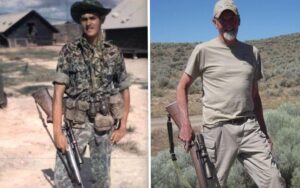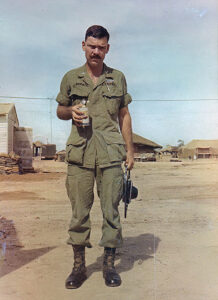Richard Armitage, a Navy adviser assisting South Vietnamese units during the war and later a State Department official working with Colin Powell, experienced something in Vietnam that few other combat veterans did. “Most GIs left in ’73, but I got to see the real end,” he says.
Armitage was a leader in the evacuation of Vietnamese refugees after the fall of Saigon on April 30, 1975. Sent to Vietnam to oversee the destruction or removal of South Vietnamese naval vessels, he decided—without seeking official authorization—to expand his mission. He would use some of those vessels as well as the destroyer USS Kirk to transport not only military personnel but also as many civilians as possible to the Philippines, where they would board other vessels for a refugee camp in Guam.
Armitage later held positions in the Office of the Secretary of Defense in Ronald Reagan’s administration. During George H.W. Bush’s presidency, he negotiated international agreements and directed the U.S. aid program for countries that broke away from the Soviet Union. From 2001 to 2005, Armitage was Powell’s deputy secretary of state.
Armitage shared his perspective on the war with Vietnam Editor Chuck Springston.
The South Vietnamese evacuation that you led is regarded as one of the great humanitarian missions of the U.S. military. How does that rank among the accomplishments in your life? I don’t look at it as an accomplishment. I look at it as the unhappy completion of a mission. Those things I consider accomplishments are related to my family, my children. The other things were missions, duty.
Were you rebuked by officials in Washington when they found out you had taken it upon yourself to use the U.S. Navy to conduct a civilian evacuation without their approval? Well, they were caught in a bind because my job was to deny those assets to the enemy, to the North Vietnamese, and I chose to deny it in the way I denied it. The government didn’t abuse me. They ignored me. And they ignored me until the year 2001, when Secretary of Defense Bill Cohen invited me to come to the Pentagon on his last day in office and presented me with the Secretary of Defense Medal for Outstanding Public Service.
You resigned from the Navy after the 1973 peace agreement with North Vietnam because you didn’t like the terms of the deal. What in the agreement upset you that much? It was the notion of leading the Vietnamese down a certain path for so long and then all of a sudden leaving them. It was quite clear to anyone who looked at the agreement and the political situation that this was just, to use Frank Snepp’s book title, a “decent interval” before we walked out.
What were your feelings about the war itself? I questioned the wisdom of U.S. ground troop involvement. I volunteered as an adviser because I did buy the proposition that if they [the South Vietnamese] were willing to struggle for their own independence, I was willing to do my part to help them. I was very much for advisers, air support, combat support. But it was soon obvious to me that we had lost the affection of the U.S. people, and once you’ve done that there is no way to prevail.
You lose support for a war when you lie, and we got into it by a lie [about the extent of North Vietnamese attacks on U.S. ships in the Gulf of Tonkin in 1964]. I think Secretary of Defense [Robert] McNamara bears a huge responsibility. As we know now from his papers, he did know early on that this was not a winnable conflict, and we kept sending young GIs over.
Could anything have been done differently in Vietnam that would have changed the outcome? The only way to change the outcome of the war would have been to change the government in Saigon. The Army counterinsurgency, under General [Creighton] Abrams [who became the head of U.S. combat forces in June 1968], was going quite well, but there was a riddle we couldn’t solve. We can train the Vietnamese—just as we can train Afghans and Iraqis—but how do you make them willing to die for their government? The government in Saigon was not worthy of the sacrifice of these men and women in Vietnam.
What are the lessons of the Vietnam War? The most obvious one is that wars are easy to get into and hard to get out of. The other lessons are that popular support at home is at least as important as success on the battlefield, and duplicating what Secretary [of State] Powell says, I’m a big decisive-force guy. If you’re going to do it, do it.
Could decisive force have been applied in Vietnam to win the war? The North Vietnamese died and sacrificed at high levels. They were willing to continue this. No U.S. commander would be allowed to suffer anywhere near the casualties they endured on a regular basis. We valued the individual soldier’s life. They valued a national dream. We bombed the hell out of both South and North Vietnam, but I don’t think we could have bombed them into the Stone Age. We could have extended things. I don’t think ultimately we would have prevailed.
During a war, what should be the role of the military leadership compared with the role of civilian leaders? Once objectives have been established and the military leaders tell you how they’re going to do it, let them be. In Vietnam, it was the opposite. The president [Lyndon B. Johnson] and his colleagues were actually picking the bombing targets. In the Bush 43 administration, it was hands-off. That didn’t work out too well, either. In recent years, because so few veterans are in the senior [civilian] positions, the civilians don’t know the right questions to ask the military in many cases and don’t understand the jargon that’s used. And very often the military does not understand the subtleties of diplomacy.
When should our military be used to help people who want freedom from a dictatorship but are unable to achieve that goal on their own? For us to assist people yearning to be free, it’s not enough for them simply to be the enemy of my enemy. They have to also embrace our values, and our assistance has to be something that makes a difference. In some cases, they don’t have the infrastructure to support democracy. The government in waiting has to be capable enough to deliver to the heightened expectations of the people. In Libya, in Egypt, you ripped the scab off, and you don’t have an idea what’s going to replace it. It’s not necessarily the case that anything’s better than the government that exists today.
What music did you listen to in the 1960s and ’70s? Marvin Gaye. Temptations. Gladys Knight. Hank Ballard & The Mighty Midnighters. I grew up in the South, and if you grew up in the South, you had two choices of music: What was called then hillbilly—and now is called country—or blues, R&B.
Were there any clothing styles you wore then that you would be embarrassed to wear today? When I was an adult, I had two modes, a suit and workout gear. When I was a teenager, it was Bass Weejuns, no socks and madras shirts. If you grew up in the South, that’s what you wore. And I wouldn’t be embarrassed to wear that today. I never got into bell-bottoms and all that stuff.
You and Powell met at the Pentagon in January 1981 during the transition from the Carter to Reagan administrations. In his memoir, Powell says you two “connected immediately.” What made that instant connection? We both were combat veterans. We both were intent on working well for [incoming Defense] Secretary [Caspar] Weinberger, who was intent on revitalizing the U.S. military in the malaise after Vietnam. And we’re both relatively irreverent to each other but respectful of authority.
First published in Vietnam Magazine’s October 2016 issue.





